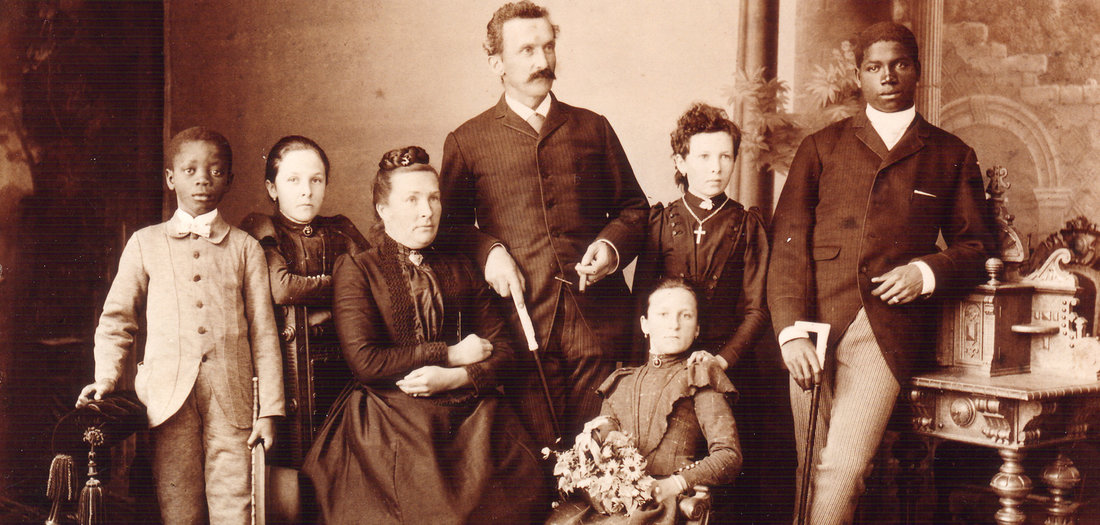Family archive Rolf-Dieter Röger and Georg Röger / Platino
–
Racist experiences were inevitable: Rudolf Duala Manga Bell (far right) and Tube Meetom (far left) with their host family in Aalen
–
On August 8, 1914, the 41-year-old ruler of the Douala people, Rudolf Douala Manga Bell, and his confidante Adolf Ngoso Din were executed with the gallows in the German colony of Cameroon. The two men had been sentenced to death by a colonial court for “high treason” after the head of the Reich Colonial Office, Wilhelm Solf, had accused them of preparing a rebellion on the basis of a forged telegram. The last words of Manga Bell were: “Innocent blood is hanging on her. You kill me in vain. Damn the Germans. God, I beg you; hear my last will that this ground will never be treaded by Germans again. “
In Cameroon, Douala Manga Bell is now a national hero, while in Germany the judicial murder of the anti-colonial activist, disguised by law, is hardly known. That is what the special exhibition “Hey Hamburg, do you know Douala Manga Bell?” The aim of the experimental show, curated by Suy Lan Hopmann and realized in cooperation with Princess Marilyn Douala Manga Bell, a great-granddaughter of the executed king, is to convey the topics of colonial heritage and racism. The central narrative strand is the graphic novel-style picture cycle »The Past is a Way« by the Nigerian artist Karo Akpokiere. In addition, there are MARKK archives and items on loan. A photo shows Rudolf Manga Bell during a carnival parade in Aalen, southern Germany. The future king, who, like many of the upper class of his people, had a German first name, had lived there for five years in the 1890s. He and another boy from Cameroon were the only blacks in town at the time – racist experiences were inevitable.
A wooden figure from the end of the 19th century showing a Cameroonian dignitary in European clothing illustrates the cultural and economic exchange between Cameroon and Germany. In 1884 Manga Bell’s grandfather King Bell had signed a “protection treaty” with the German Empire, which gave them the administration of the area on the Douala River. In return, the Douala should keep their land and their monopoly on trade with the hinterland. For the wealthy Douala merchant class, to which the ruling Bell family belonged, obtained rubber, palm oil and ivory from the interior of the country, which they ceded to European trading companies in exchange for tobacco, salt, brandy and fabrics. But for the Germans – Hamburg trading companies were a driving force – the agreement served as a door opener for further colonial submission.
In 1910 the German governor began expropriating and expelling the locals on the banks of the Douala River in order to have a city built there only for Europeans. Apartheid structures were justified in the name of hygiene. Because the blacks – and not their miserable living conditions or inadequate medical care – were blamed by German scientists for the spread of diseases such as malaria. For Manga Bell – until then an admirer of everything German – this racial degradation came as a shock. The king now took up the political struggle against the “violation of the law of the expropriation of the Douala”. He formulated petitions to the Reichstag, while his secretary Adolf Ngoso Din organized the support of liberal journalists, lawyers and social democratic politicians such as Paul Levi and Hugo Haase in Berlin. Manga Bell and Ngoso Din had to pay for their resistance – not with the spear or rifle, but with the word and the law – with their lives. Her anti-colonial struggle was continued by Din’s fiancé Maria Mandessi Bell, among others. With a view back to the decolonization, the exhibition reminds us that the princess, who had lived with a Baptist host family in Brandenburg in 1912, paved the way for the pan-African “Négritude” movement.
– .


